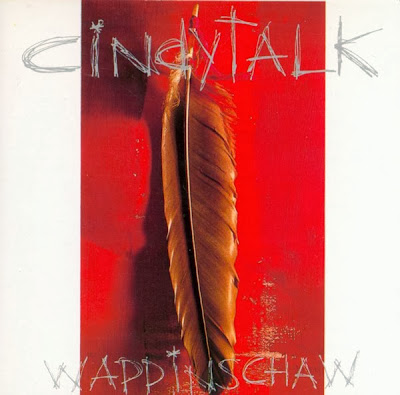When Bauhaus guitarist Daniel Ash began working on an informal
solo-based side project in early 1982, little did he know that within a
year, not only would it evolve into a group project called Tones on
Tail, but it would also become his main gig, as the recording sessions
for Bauhaus' then-swan song, Burning from the Inside, made it
apparent that relations between Peter Murphy and the rest of the band
were quickly deteriorating. After Murphy bolted to work with Mick Karn
on the Dalis Car project
previous to jump-starting his solo career, Ash, along with former art
school buddy and ex-Bauhaus roadie Glenn Campling and Bauhaus drummer
Kevin Haskins, decided to leave behind the overt Gothic theatricality of their
former band, choosing instead to focus on a more eclectic and
experimental sound. Ash: "It was a great time, reaching out to something
different. It was quite liberating after Bauhaus. In the end, we wanted
a different type of music and [Peter Murphy] wanted to go in a more
dance direction." Campling describes the early evolution of the band:
"Dan was working towards a solo project when we lived in 'digs' during
the Bauhaus heydays. I was backline roadie at the time. He was recording
"Instrumental" and another track which became "Copper" (featuring both
of us laughing our heads off- Dan's first vocal maybe?). He invited me
to contribute to an idea which eventually became "A Bigger Splash" and
"Means of Escape." The ball rolled on from there. We both enjoyed the
distraction."
During Tones on Tail's two-year existence, they recorded
one LP, Pop, and several EPs, all of which garnered critical
praise for their unique and innovative mixture of neo-psych melancholy
(something Ash and Haskins would explore further in Love and Rockets)
with lighter, more dance-oriented elements. For example, on "Lions," the
lead track on Pop, the band establishes a spectral samba effect,
which joins Ash's seductively hushed vocals in creating a fine piece of
moody pop that proves far more accessible than anything Bauhaus would
have committed to tape. Likewise, on "Happiness," with its swinging
cocktail-Jazz arrangement and playfully sarcastic lyrics, Tones on Tail
prove effective at integrating a wide range of influences into a sound
that, while echoing the experimental side of Bauhaus (an extremely
under-appreciated aspect of the band, an example of which is the
brilliant dub effect on "Bela Lugosi's Dead"), clearly stakes out its own territory. Another instantly memorable track is "Performance," one of the darker songs on Pop.
With its cheesy synth-driven opening bars that somehow manage to set up
an atmosphere of dread that pervades the entire song, along with Campling's nervy
bass-lines and Haskins' adventurous percussion, Ash couldn't have asked
for a better back-drop for one of the best, most straightforward vocal
performances of his career. While Tones on Tail has never enjoyed the
popularity or notoriety of Ash's more psychedelically-inclined work in
Love and Rockets, it could be argued that this short-lived band not only
drafted the blueprint for the latter band's sound, but did so while
managing to sound far more experimental and unprecedented. Ash: " We
were a motley crew of individuals who essentially wanted to sound like a
band from Venus or Mars!"



